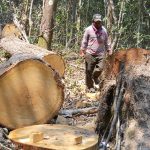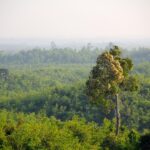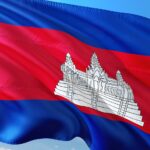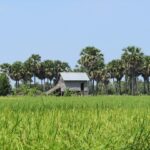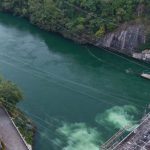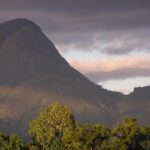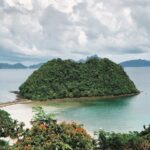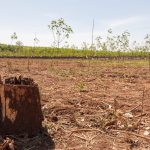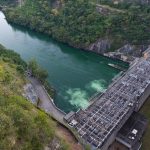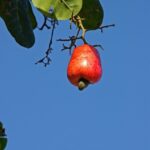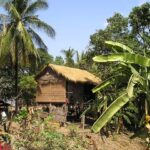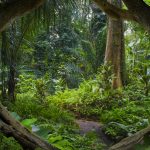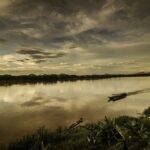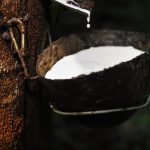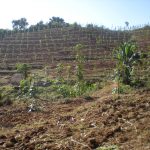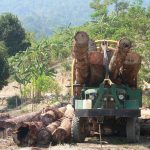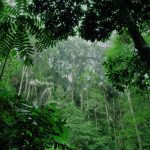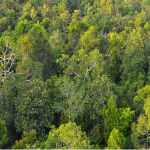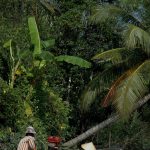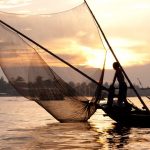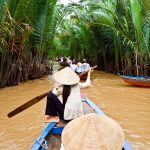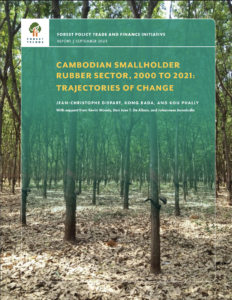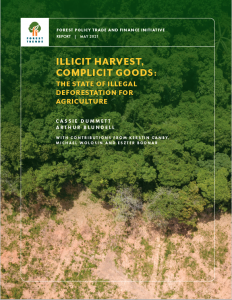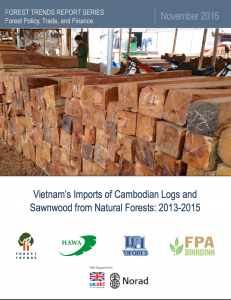
Cambodia has seen high rates of forest loss over the last few decades. Between 1973 and 1993 the country saw an annual rate of forest loss of approximately 0.5 percent. Such losses were reportedly caused by commercial logging and 30 years of civil war and political instability. As deforestation rates continued to increase, the government banned log exports in 1996, joined the Convention on International Trade in Endangered Species of Wild Fauna and Flora (CITES) in 1997 and instituted a concession system. Between 1994 and 1997, the government granted 36 forest concessions that collectively covered 7 million hectares. Reports have estimated that 95 percent of the timber harvested between 1997 and 1998 was illegally felled. The government of Cambodia adopted a logging moratorium in 2002. The restrictions did not apply to other types of concessions in the country. Timber may be sold or exported from agriculture and infrastructure concessions, as well as community forestry areas, social land concessions and privately owned or managed plantations.
Cambodia lost almost 2.5 million hectares of tree cover between 2001 to 2020, a 28 percent loss in tree cover since 2000. The annual rate of loss increased by more than 400 percent over the same period with nearly 150,000 ha of loss occurring in 2020 alone, of which nearly half (43 percent) was to natural forest.
- There is a high risk of illegal logging and trade for timber products originating from Cambodia.
- Economic Land Concessions (ELCs) for infrastructure and commercial agriculture projects allow “pseudo-legal timber extraction, saw-milling, and wood transportation” as well as “the laundering of illegally harvested timber in equal, if not greater, proportions.” Using the ELC system as a tool for timber harvesting in natural forests is rampant but considered illegal. Corruption is reportedly a concern in the allocation of ELCs.
- NGOs continue to document incidents of illegal logging in protected areas.
- There remains a risk of unsustainable and illegal trade in Convention on International Trade in Endangered Species (CITES)-listed species.
- Enforcement is weak and hampered by corruption.
- Historically, there has been a risk of illegal cross-border trade to Vietnam but this has reportedly declined in recent years.
Read more by downloading the Cambodia Timber Legality Risk Dashboard here.
Cambodia once profited heavily from exploiting its natural resources, particularly through illegal logging and land concessions. Powerful elites—including tycoons, military officials, and local governors—benefited from this extractive economy, enriching themselves through the sale of timber and state land. However, the country’s forests have now been nearly depleted, with some of the world’s worst deforestation rates tied to state-backed illegal logging. Similarly, land concessions have been exhausted, with little public land left to sell and many long-term deals yielding minimal returns.
This collapse has undermined a key funding source for the Cambodian People’s Party’s patronage system. As traditional extractive resources have dried up, the regime has increasingly relied on more opaque and illicit activities. In particular, Chinese-run online scam operations have emerged as a lucrative alternative revenue stream. This shift highlights a broader trend: Cambodia’s criminal networks are now moving beyond resource exploitation and turning toward other forms of illicit enterprise.
Cambodian journalist Chhoeung Chhoeng, who specialised in environmental issues, was shot dead in December 2024 by a suspected illegal logger. Reporters Without Borders (RSF) welcomes this sentencing and now calls on the Cambodian authorities to end their repeated attacks on press freedom, which fuel this climate of violence.
On 5 June 2025, the independent media outlet CamboJA News revealed that a court in Siem Reap province, north-west Cambodia, had sentenced Sy Loeuy to 12 years in prison for the murder of environmental journalist Chhoeung Chhoeng. In its ruling, issued on 28 May but not made public until now, the court also ordered the killer to pay approximately 55 million KHR (13,500 USD) in compensation to the journalist’s family.
The National Assembly’s Standing Committee on Human Rights was given a grim briefing on human trafficking on Tuesday, revealing that around 10,000 Pakistanis are currently trapped in the forests of Cambodia and Burma. These victims of organized human trafficking networks are reportedly being forced into illegal logging, agricultural labour, and drug trafficking.
The indigenous Kuoy community in Preah Roka Wildlife Sanctuary, located in Preah Vihear province, has provided what they say is fresh evidence to back their claims of widespread illegal logging in protected areas. In their statement yesterday, the Kuoy community said they conducted field visits in Preah Roka Wildlife Sanctuary, uncovering approximately 334 cases of forestry crimes. The evidence posted on the Facebook page included photographs of felled trees of various sizes, logging camps, chainsaws, and other illegal logging equipment.
In a statement issued on Saturday, the Preah Vihear Provincial Department of Environment dismissed reports about illegal logging, labelling them as false and unfounded.
Cambodian environmental journalist Ouk Mao was attacked by a group of men, apparently including a former police officer, while documenting illegal logging in Prey Lang Wildlife Sanctuary, following a pattern of escalating harassment and threats.
Mao has faced numerous legal challenges, including defamation and incitement charges, that he claims are retaliation for exposing environmental crimes, with local officials allegedly trying to silence his work.
Cambodia’s crackdown on critical journalism has intensified, with Mao’s case reflecting a broader decline in press freedom, as highlighted by the country’s plummeting rank in the 2025 Reporters Without Borders Press Freedoms Index.
Advocacy groups like the Committee to Protect Journalists and Cambodian Journalists Alliance Association warn that the lack of accountability for attacks on journalists has created a dangerous environment for those reporting on illegal logging and other sensitive issues.
Around 4,000 logs of a valuable species of hardwood, classified as a Type 1 luxury timber, were seized by a joint force in Mondulkiri province over four days at the end of April. The logs were illegally felled and removed from a protected natural area. Among the logs, some were found to belong to a pepper plantation owner named Soeun Noeun in Busra village and commune, in Pechreada District.
On May 2, the Pechreada district administration denied allegations that local officials accepted money from forest crime groups operating in the Atroang area, in Puchrey Chonphang village, Puchrey commune. This denial follows recent logging activity by timber traders in the Phnom Prech Wildlife Sanctuary.
Cambodia’s Supreme Court has denied bail to five environmental activists from the NGO Mother Nature Cambodia, all of whom are appealing their convictions after spending more than nine months behind bars. The activists had already served prison sentences but were released on bail in November 2021 on the condition that they stopped their environmental work; the charges against them were never dropped and the Cambodian government arrested them again in 2024.
Cambodian authorities have approved a new cement factory inside Prey Lang Wildlife Sanctuary, despite a 2023 moratorium on new mining licenses, raising concerns about enforcement and conservation integrity.
Factory developer KP Cement, a politically connected firm previously linked to deforestation, was awarded a 50-year lease on 99 hectares (245 acres) within the ostensibly protected sanctuary and is already clearing forest near a planned limestone mine.
Local communities have expressed alarm over environmental degradation, health risks from limestone dust, and being excluded from decision-making, saying the development benefits only elites.
The project reflects a broader pattern of politically tied companies exploiting Prey Lang’s resources despite its protected status, with critics accusing the government of favoring industry over conservation.
The Cambodian government has approved at least three new irrigation dams across the Cardamom Mountains, carving even deeper into forests currently being used for the Southern Cardamom REDD+ and Samkos REDD+ carbon credit projects.
In June, Mongabay identified instances of illegal logging linked to the dam. A few months later, Environment Minister Eang Sophalleth wrote to Ly Yong Phat, the developer of the dam — an infamous ruling party senator and tycoon with a documented history of illegal logging and land grabbing — ordering that logging cease. Both satellite imagery and Global Forest Watch deforestation alerts indicate that the logging has persisted and that much of it has taken place outside of the area the company is licensed to clear.
The global agarwood trade heavily depends on wild-harvested endangered tree species, despite international regulations for protection, with significant volumes going undocumented in official trade records, a new study reveals.
About 70% of the trade depend on Aquilaria filaria and Aquilaria malaccensis, both threatened species, sourced from the wild, raising major sustainability concerns. Meanwhile, there are some tree species that are not even covered by CITES, the global wildlife trade convention.
Due to discrepancies between CITES and customs data, along with weak enforcement and outdated regulations, researchers suggest the illegal trade is far larger than reported.
Researchers urge stronger monitoring, updated data, expanded species protection, and a shift to cultivated sources. They also call on consumers and wealthy importers to support conservation and governments to promote sustainable practices.
At the meeting on January 8, 2024, Kim Leang said that illegal logging and land grabbing are still significant occurrences, which the relevant parties must jointly discuss and resolve in accordance with the law. In addition, relevant officials must show the area where illegal logging and land grabbing have occurred in the Boeung Per Wildlife Sanctuary and the Phnom Thnot-Phnom Pok Wildlife Sanctuary in Siem Reap Province to report to the Ministry of Environment and the Royal Government.
The nephew of former Prime Minister Hun Sen has threatened to sue a prominent businessman who alleged that US$9 million was stolen from a Chinese investor who sought government approval for a mine.
The report later states that
He was featured prominently in The Sting, a 2012 book by investigative journalist Nick McKenzie about Australian law enforcement’s attempts to tackle the international drugs trade.
According to McKenzie, Hun To was a target of an Australian police investigation in 2003 into the smuggling of heroin from Cambodia to Australia in timber shipments.
McKenzie claimed Hun To only evaded arrest thanks to the intervention of Australian Embassy officials in Phnom Penh seeking to avoid a diplomatic incident.
Over 5,000 cubic metres of forest by-products – seized as evidence of past offences – will be publicly auctioned early next month. The base value of the items is estimated at nearly half a million dollars.
A Cambodian journalist died on Saturday after he was shot this week while investigating illegal logging in the country’s northwest, police said.
Six environmental activists were held in custody in Cambodia from Nov. 23-25 as they were investigating illegal logging in a national park. The six, including Goldman Prize winner Ouch Leng, were released without charge, after earlier being accused of unauthorized entry into Veun Sai-Siem Pang National Park.
Their arrest is the latest in a string of crackdowns against environmentalists and journalists, which has accelerated under Cambodia’s new prime minister.
Veteran activists have slammed the arrest as yet more state “terrorism” against civil society for exposing the plunder of the country’s environment by politically connected operatives.
Cambodian companies producing engineered hardwood flooring for the U.S. market are getting their timber from a company described as a cartel that’s been repeatedly accused of illegally logging inside protected areas. Angkor Plywood is the sole supplier of plywood to flooring manufacturers based in the Sihanoukville Special Economic Zone, and claims the wood comes from its acacia and eucalyptus plantations.
However, watchdog groups, industry insiders and independent media, including Mongabay, have long documented evidence of Angkor Plywood and its supplier, Think Biotech, felling tropical hardwoods inside Prey Lang Wildlife Sanctuary.
AHF Products, which claims to be the biggest U.S. wood flooring manufacturer, runs a factory in the Sihanoukville SEZ, but denies any protected wood entering its supply chain — a claim industry veterans question, given Angkor Plywood’s notoriety.
A year-long Mongabay investigation shows that one of Cambodia’s most notorious logging companies likely illegally exported rare tree species to Vietnam and China for years.
Mongabay found evidence Angkor Plywood has been illegally logging timber from protected areas and violating various laws by exporting sawn logs — and doing all this with impunity, in part thanks to its well-connected founders.
Shipping records from 2021-2023 show Angkor Plywood exported a type of timber coveted in the furniture trade from a species it should never have been allowed to log or trade, according to a government source.
Cambodia’s environment minister has ordered a ban on forest clearance at a hydropower project site where activists and media previously reported indications of illegal logging.
The Stung Meteuk hydropower project is being developed by a company under Ly Yong Phat, a ruling party senator with a reported history of environmentally and socially destructive businesses. In April, Mongabay documented the illegal logging operations at the project site, where logging routes had been cut leading into the nearby Phnom Samkos Wildlife Sanctuary.
Ouk Mao, a journalist who covered the land grab and deforestation of a community forest by a mining company has himself been charged with deforestation. Ouk Mao was instrumental in bringing to light the takeover of the Phnom Chum Rok Sat community forest in Stung Treng province by the politically connected company Lin Vatey.
In mid-September he was charged with deforestation and incitement, for which he faces up to 10 years in jail; while not detained, he’s subject to court-ordered monitoring and cannot leave his village without permission.
The sanctions announced on Thursday by the U.S. Treasury Department’s Office of Foreign Assets Control also targeted Ly Yong Phat’s LYP Group conglomerate and several hotels for alleged abuses of trafficked workers at online scam centers. Earlier this month, the government suspended a controversial hydropower project owned by Ly Yong Phat, located inside a wildlife sanctuary, citing illegal logging.
On the sidelines of the 27th ASEAN event, the Vietnamese delegation and their Cambodian counterpart signed a Memorandum of Understanding (MoU) on bilateral cooperation in forestry for the 2024 – 2029 period.
The key areas of collaboration include information and experience sharing; promoting investment in forestry, timber trade; scientific research, training, and capacity building; forest protection including fire prevention and control; ecosystem restoration, and transboundary biodiversity conservation. The two sides also pledged to collaborate in combating illegal logging and timber smuggling, illegal poaching of wildlife and plants, and adaptation to and mitigation of climate change impacts.
Cambodian court on Tuesday sentenced 10 environmentalists to between six and eight years in jail for plotting to commit crimes in their activism — the latest legal crackdown on the country’s green campaigners.The activists from Mother Nature, one of Cambodia’s few environmental advocacy groups, denied the charges, which they said were politically motivated.
Also reported here: Cambodia accused of conducting political trial as it jails green activists | Environment News | Al Jazeera
Loggers are targeting protected forests in Cambodia’s Cardamom Mountains using the cover of a new hydropower dam. The dam is being built by Ly Yong Phat, a wealthy Cambodian tycoon with ties to the top tiers of government and a long history of environmental vandalism in the Cardamoms
Timber from the Stung Meteuk hydropower dam has already been sold via a government-facilitated auction, but some timber may have been illegally logged. The dam also overlaps significantly with the Samkos REDD+ project which is still under validation and verification
Authorities are hunting for the alleged mastermind behind serious forestry crimes in Pursat province. The provincial governor explained that the illegal logging in the Oral sanctuary could not have been carried out without the collusion of people in the area. He noted that while some timbers were transported on motorbikes or home-made trucks, suggesting small-scale family activities, the total amount of timber logged and removed was on a grand scale. “[Ta Hoy] is the biggest target in the province, and I have been informed that he has committed similar offences in other provinces. The courts have ruled that his property was obtained from deforestation, a form of money laundering. Wait and see, [we] will not allow them to destroy the nation … That is a forest crime,” he said.
A civil society organization believes that UNDP has championed companies linked to human and environmental rights abuses, and is promoting them as “investment opportunities”.
The article highlights a few companies and investment groups by name, mostly in the forestry and agricultural sectors.
Also reported in Mongabay: Cambodian companies tied to abuses promoted by UN program, rights group alleges (mongabay.com)
The trial against Mother Nature Cambodia, one of the country’s last environmental activism groups, kicked off at the Phnom Penh Court of First Instance on the morning of May 29. Ten environmental activists are on trial for allegedly plotting against the government, a charge that carries a prison sentence of between five and 10 years.
The recent video from northern Cambodia shows that hundreds of hectares of forest in the vast Prey Lang Wildlife Sanctuary have been subject to clearance. Activists have said that government authorities have done nothing in the years since to prevent supporters of the ruling Cambodian People’s Party from illegally exporting timber to neighboring Vietnam, a major buyer of luxury hardwood.
Cambodia’s reliance on microloans, long touted as a way to reduce poverty, belies concerns over debt-fuelled deforestation. Farmers, reliant on microloans to compensate for crop failures or to invest in their small farms, become locked in a cycle of debt and resort to illegal land conversion. Deforestation, driven by the need to honour microloan commitments, is causing alarm among conservation groups.
A senior Cambodian official notorious for illegal logging appears to be carving out a vast swath of forest in what’s supposed to be a protected area in the country’s north.
After the processing of cashews declined in the past few years, the sale of timber from Santana Agro’s cashew factory increased, with allegations that the company had hired outside loggers and colluded with members of the community to gut the forest of all the valuable timber species.
A freeze announced late last year on new mining operations in Cambodia’s Prey Lang Wildlife Sanctuary comes with a massive loophole. Try Pheap, a powerful tycoon and adviser to the previous prime minister, controls a company that was last year granted 28,000 hectares inside the sanctuary to mine iron ore.
The name Try Pheap is synonymous with illegal logging in Cambodia, including the trafficking of high-value Siamese rosewood trees that drove the species almost to extinction in the country. While Try Pheap was hit by U.S. sanctions in 2019, his company that holds the mining concessions in Prey Lang, Global Green, isn’t on the sanctions list and appears to be ramping up its operations.
Southeast Asia has never been an easy place for activists, but a worrying trend emerged over the course of 2023 that saw environmental and Indigenous activists increasingly placed in the crosshairs of authoritarian governments as a result of their activism.
Mongabay presents a short summary of status of illegal logging and forest governance in SE Asia.
The mismanagement of large swaths of Cambodia’s land by the country’s elites under the policy of economic land concessions has displaced thousands of rural families and accounted for 40% of total deforestation.
With even the government seeming to acknowledge the ineffectiveness of ELCs as an economic driver, calls are growing to return the land to dispossessed communities or repurpose them in other ways.
European Union rules aimed at stopping deforestation threaten widespread disruption for Southeast Asia’s rubber sector, from Cambodia’s 30,000 small farmers to major exporters in Thailand and Malaysia.
The concern for Southeast Asia, critics say, is that these requirements will disproportionately hurt small farmers while failing to adequately address rubber’s role in deforestation.
The deforestation caused by the rubber farming in Thailand and the world has been significantly underestimated, according to new findings from two scientific studies, with Southeast Asian rubber production potentially contributing up to three times more forest depletion than previously thought.
With over 4 million hectares of forest lost for rubber production since 1993, an area the size of Switzerland, “the effects of rubber on biodiversity and ecosystem services in Southeast Asia could be extensive,” according to a paper published on Wednesday in the journal Nature.
In Southeast Asia, mature rubber plantations covered 14.2 million hectares. Indonesia, Thailand, and Vietnam accounted for more than 70% of these plantations.
China, Malaysia, Myanmar, Cambodia, and Laos were also important rubber-producing countries. Rubber plantations that were closed down before 2021 were excluded from the analysis, despite the fact that they may have contributed to deforestation.
The deforestation caused by the rubber farming in Thailand and the world has been significantly underestimated, according to new findings from two scientific studies, with Southeast Asian rubber production potentially contributing up to three times more forest depletion than previously thought.
With over 4 million hectares of forest lost for rubber production since 1993, an area the size of Switzerland, “the effects of rubber on biodiversity and ecosystem services in Southeast Asia could be extensive,” according to a paper published on Wednesday in the journal Nature.
In Southeast Asia, mature rubber plantations covered 14.2 million hectares. Indonesia, Thailand, and Vietnam accounted for more than 70% of these plantations.
China, Malaysia, Myanmar, Cambodia, and Laos were also important rubber-producing countries. Rubber plantations that were closed down before 2021 were excluded from the analysis, despite the fact that they may have contributed to deforestation.
A new report indicates that rubber-related forest loss has been substantially underestimated in policy, by the public and in recent reports. Direct remotely sensed observations show that deforestation for rubber is at least twofold to threefold higher than suggested by figures now widely used for setting policy
The Cambodian government has suspended a planned marble mine inside a wildlife sanctuary that it had approved just months earlier.
It’s not clear why this commercial extractive concession inside a protected area was approved in the first place, or why it’s now been suspended (but not canceled).
The mine would have threatened an important REDD+ project in Keo Seima Wildlife Sanctuary that benefits both local communities and the area’s biodiversity.
Cambodia’s leaders are anxious to prove to the world that the forest conservation mechanism can address climate change while providing opportunities for people to thrive in a “new Cambodia”. But there are concerns about greenwash, and observers point to how such projects can end up being a guise for illicit land grabbing by ruling elites.
Various ministries have established strict action plans to prevent illegal logging and illegal clearing of state lands during the national election.
Cambodia’s largest island, Koh Kong Krao, off its southwest coast, is covered in largely untouched old-growth forest, but recent satellite imagery shows deforestation is spreading.
Much of the forest cover loss is in areas tightly controlled by Marine Brigade 2, a navy unit stationed on the island that has historically been accused of facilitating the illicit timber trade.
Residents of the island said the navy controls almost every aspect of life there, with provincial officials afraid to intervene or investigate the military’s actions on Koh Kong Krao.
Cambodia’s military has long been a key factor in illegal logging across the country, and reporters found evidence of its continued involvement in logging across the Cardamoms.
Thailand, Laos and Myanmar are at the frontlines of illicit trade in Asia dominated by transnational organized crime syndicates.
The trafficking in illegal narcotics, precursor chemicals, timber and wildlife, people and illicit goods across Southeast Asia is being tackled thanks to the support of the specialized UN agency focusing on drugs and crime.
Forest protection activists found more than 200 fallen trees that had been illegally cut down in a vast protected area of northern Cambodia that showed signs of around-the-clock operations, transport trucks, motorcycles and armed security.
This article covers NGO claims that land grabbing in Cardamom mountain’s state forest “is done by people in high positions who are looking to sell the state land illegally”.
Ministry of Environment spokesman Neth Pheaktra said the ministry has been enforcing forestry laws strictly to prevent crime in the Cardamom mountain and forest reserves and sanctuaries throughout the Kingdom. “Legal action has been taken against government officials and other offenders for serious forestry crime,” said Pheaktra.
A Mongabay investigation indicates that a three-star military general who also serves as a top interior ministry official appears to be the notorious illegal logger known as Oknha Chey.
Family and business ties link Meuk Saphannareth to logging operations in northern Cambodia that satellite imagery shows are clearing forest well outside their concession boundaries.
While Stung Treng residents living near the forest were all familiar with the nickname Oknha Chey, none could provide his real name or that of his company. Most simply said they believed it was a South Korean company operating the sawmills and taking the timber, but that this company was under Oknha Chey’s control.
The South Korean connection stems from a March 11, 2022, letter from Cambodia’s cabinet, formally known as the Council of Ministers, seen by Mongabay, which announced that a 9,788-hectare (24,187-acre) economic land concession had been issued to Horizon Agriculture Development. The move prompted rights groups to question whether the government had violated its own 2012 moratorium on issuing new economic land concessions.
The first report “Forest crimes in Cambodia” explores the ways in which laws, regulations and policies designed to afford protection for Cambodian forests and the local and indigenous people who depend on them are being abused. It also investigates deforestation in Prey Lang and Prey Preah Roka (two wildlife sanctuaries in northern Cambodia, where thousands of trees have been illegally harvested and subsequently processed into plywood or luxury timber for export. Part II presents evidence and case studies from field visits.
Illegal logging is on the rise in Sre Pok Wildlife Sanctuary in Mondulkiri province, with timber traders rushing to move the luxury wood along smuggling routes into Vietnam, right under the noses of local authorities.
Suppression of forestry continues, as the authorities conducted a crackdown on an illegal logging site in Kampong Speu. The crackdown was conducted on April 27 at Po Tbeng Village, Nitan Commune, Bor Seth District, Kampong Speu. Bor Seth District Unity Command, led by Sin Sarun, District Administration Director, raided the illegal logging site and seized some materials.
Cambodian environmentalists called for authorities to reinvestigate the 2012 murder of a forestry activist, who was slain while campaigning against illegal logging, a problem that has gotten worse in the decade since his killing. Chut Wutty was shot to death on April 26, 2012 while investigating illegal logging in southern Cambodia’s Koh Kong province.
In its latest crackdown, the government has arrested several members of the Mother Nature group.
Planet Labs PBC (NYSE: PL), a leading provider of daily data and insights about Earth, today shared a recent project tackling deforestation in Cambodia with Amnesty International, an international non-governmental organization focused on human rights. With Planet’s daily satellite monitoring capabilities, Amnesty International is working to identify and shed light on environmental and human rights abuses in the region. Using Planet’s datasets, Amnesty International is currently working to protect the Prey Lang Wildlife Sanctuary, southeast Asia’s largest lowland evergreen forest spanning approximately 500,000 hectares across four provinces of Cambodia. Designated as a wildlife sanctuary in 2016, Prey Lang is government-protected land, containing diverse flora and fauna. This land plays a vital role in the traditions, local customs, and beliefs of indigenous people and local communities. Yet, recent events have weakened the sanctuary’s natural defenses and degraded its borders.
There were 811 cases of forest crimes, land grabs, and illegal hunting of wildlife reported last year, and of the number 320 involved in forest crimes were fined while another 491 were taken to court.
The National Committee for Forest Crime Prevention has touted its tougher measures to suppress illegal logging across the country as a success despite small-scale ones are still occurring. More than five years since its inception, the committee handled two high-profile cases related to the arrests of two tycoons infamous for illegal logging in 2019.
The Preah Vihear Provincial authorities will go hard on anyone trying to smuggle out luxury-grade wood to Thailand or neighbouring countries.
Forest crime, including illegal logging and transportation of timber, is rampant in the Cardamom Mountains Wildlife Sanctuary, according to the environmental watchdog ACNCIPO.
Rampant illegal logging of protected forests is threatening the cultural survival and livelihoods of indigenous people in Cambodia, according to Amnesty International. Members of the Kuy people, one of the largest of Cambodia’s 24 indigenous groups, told Amnesty how deforestation in two protected forests, along with government restrictions on access have undermined their way of life and violated their human rights.
Tbong Khmum provincial deputy governor Cheng Bunnara has ordered district police officers to identify illegal wood processing facilities in their respective jurisdiction and instruct the owners to apply for a permit before resuming their business. Bunnara said that in order to bring the activities of illegal timber processing facilities under control and crack down on the illegal timber trade in protected areas, the owners of all such facilities have to follow procedure and apply for permits to continue operating.
In recent decades, rich tropical forests of the Greater Mekong region have been steadily depleted by the world’s growing appetite for timber. Recognizing the impact of the timber trade on natural forests, governments in the Greater Mekong region have come up with laws to regulate logging and timber exports.
Cambodia and Vietnam have expressed their commitment to strengthen forest sector cooperation, mainly combating the cross-border trade of timber and wild animals.
Click here to access the Global Illegal Logging and Associated Trade (ILAT) Risk assessment tool and to download the Forest Trends User Guide describing the functionality of the ILAT Risk Data Tool.
Click here to access the Cattle Data Tool.


